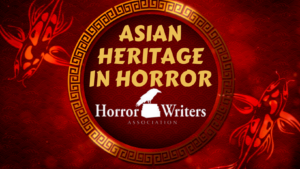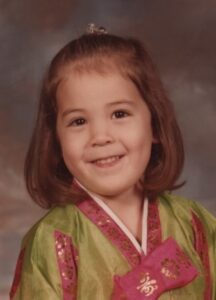Asian Heritage in Horror: Interview with K.P. Kulski

 K.P. KULSKI is a Hawaii-born Korean-American author, historian, and career vampire of patriarchal tears. Channeling a lifelong obsession with history and the morose, she’s managed to birth the gothic horror novel Fairest Flesh and novella House of Pungsu. She bartered nine years of her life to the U.S. Navy and Air Force for food and later taught college history to a captive audience. Trapped by a force field, she currently resides in the woods of Northeast Ohio where she (probably) brews potions and talks to ghosts. Follow her on Instagram and Twitter: @garnetonwinter or visit garnetonwinter.com.
K.P. KULSKI is a Hawaii-born Korean-American author, historian, and career vampire of patriarchal tears. Channeling a lifelong obsession with history and the morose, she’s managed to birth the gothic horror novel Fairest Flesh and novella House of Pungsu. She bartered nine years of her life to the U.S. Navy and Air Force for food and later taught college history to a captive audience. Trapped by a force field, she currently resides in the woods of Northeast Ohio where she (probably) brews potions and talks to ghosts. Follow her on Instagram and Twitter: @garnetonwinter or visit garnetonwinter.com.
What inspired you to start writing?
Honestly, first, it’s rooted in trauma—losing my mother at a young age and the experience of being abused as a child, then later losing my first son as a new mother. Second, it’s rooted in my struggle with my own biracial, Asian-American identity. Third, the fact I emerged from the womb a fully formed feminist into a patriarchal world.
I write because it’s how I’ve dealt with things. Writing starts between the writer and the words, the emotions, and the stories in our heads. It’s a private thing that can turn into something we share with others. So here I am.
What was it about the horror genre that drew you to it?
Ok, time to talk about horrible secrets—no just kidding, but in all openness, I was not the horror aficionado that many in the community are (and love them for). I remember in 5th grade feeling triumphant because I forced myself to watch Nightmare on Elm Street and I could finally talk about it with the kids at school. Subsequently, I lived my own version of Nightmare on Elm Street, absolutely terrified by the thought I’d meet Freddy when I fell asleep. I have always had a strong imagination and deep love for stories and could freak myself out without any help.
But I was rather obsessed with ghosts and mysterious supernatural occurrences. Remember Unsolved Mysteries? Oh god, I watched so much of that show. Any mention of a haunting I was there. I went to a little Catholic school for middle school and we had this basement library and it always had plenty of books on what was claimed to be real hauntings. Photos of apparitions and all that…I checked out every single book in that little dank place. And scared myself out of my mind, I might add.
Ultimately, horror chose me and I’m so glad it did.
Do you make a conscious effort to include Asian and/or Pacific Islander characters and themes in your writing and if so, what do you want to portray?
Whether people realize it or not, most of my characters are Asian or mixed-Asian characters with the exception of Fairest Flesh (being that it was set in 16th-century Hungary). So perhaps, it’s more…when a character is not Asian, that is a conscious effort (haha). All of this is especially true now. My characters are often based on the fierce women from my mother’s family, Korean women who’ve survived horrible things and managed to keep going and make a life in the United States.
Much of what I’m writing right now depicts Asian diaspora experiences. Those experiences are very rooted in relationships. I want to portray how complicated this can all be, especially for us who are mixed-race Asians. Who are we to our parents? Who are we to our friends? Our nation? We don’t get to just be, we are constantly questioned, examined, deemed not enough, and alienated from many sides. Yet here we are still, existing as we are, from multiple worlds, no matter what anyone thinks. I want to examine that confusion and how isolating it can be.
What has writing horror taught you about the world and yourself?
That we need to be okay with looking into the abyss and okay with all the possibilities we find in there. But even when we see the scariest or bleakest thing within, we still have power. Furthermore, writing, reading, and watching horror have helped me exorcise my own demons and to express pain. It’s like pulling out poison but turning it into something useful. Horror is a powerful and transformative genre.
How have you seen the horror genre change over the years? And how do you think it will continue to evolve?
I’ve seen horror become a major influencing force. I think particularly in the world of television, there’s been so many great horror shows that have hit mainstream audiences. This really has a lot to do with the increase in opportunities and different approaches to entertainment from streaming services. We are also getting better access to horror from all around the world.
Storytelling allows us to experience many perspectives and horror always taps into that. I think people are getting to understand that horror isn’t just slashers, which are completely good in their own right, but the genre encompasses so much more.
In the lit world, horror has become increasingly diverse and for the most part, the community has embraced, promoted, and celebrated the diverse voices. There have been some notable exceptions, but I was impressed with the number of people in the community who stepped forward and shut that kind of crap down. Yes, those folks persist, but now they aren’t provided a platform of any worth. And yes, we still need to do better. It’s important we don’t stop because we are going in the right direction.
How do you feel the Asian and/or Pacific Islander communities have been represented thus far in the genre and what hopes do you have for representation in the genre going forward?
The gorgeous and award-winning anthology Black Cranes: Tales of Unquiet Women edited by Lee Murray and Geneve Flynn started a movement. When I read the anthology I saw my own experiences, expressions of my rage and sorrow. It rocked me. It’s funny, with representation, you know you need and want it to happen, but you don’t truly know how much your soul hungered for it until you suddenly have something in your hands that represents you for the first time. I remember my heart hammering in my chest as I read it, it was that groundbreaking for me.
Then came Tortured Willows: Bent. Bowed. Unbroken., a collaborative poetry collection written by Angela Yuriko Smith, Lee Murray, Christina Sng, and Geneve Flynn. I was unbelievably honored to have written the foreword, but let me tell you, the pain expressed in this collection cut my heart out of me. No one before talked about those things. I wept so much reading it and it was an expression direly needed.
Since then Unquiet Spirits: Essays by Asian Women in Horror edited by Lee Murray and Angela Yuriko Smith released, and already it’s become this gorgeous titan bearing our voices and an essential work. The amount of honesty in the collection is searing. I’m not sure there are many, if any, works that cracks open the core of Asian women like this does. Continuing the movement, I can’t forget to mention the re-release of Black Cranes with Raw Dog Press.
So we’re here and pushing for representation, but one thing to note this is all fought for by Asian women horror writers. Which is, of course, how these things start—BUT I want to see more presses, media, reviewers, other authors, etc. thinking about the stories we bring and actively allying with us. I’m tired of our experiences being invisible. It’s crickets when we experience racism and I want a chance to not only be represented but to be SEEN.
Who are some of your favorite Asian and/or Pacific Islander characters in horror?
I’ve answered this question often, so I think I’m going to go in another direction with this and about my favorite Asian characters in general, all, in my opinion, overlap into horror.
There’s a great short story in the Sci-Fi/Fantasy anthology Where the Stars Rise edited by Lucas K. Law and Derwin Mak, called “Memoriam” by Priya Sridhar. The character Anish’s robotic father chills me. This robot exists after the death of Anish’s human father and Anish treats him as if it is his father. It’s creepy but with a bite of grief and loss. An exceptional story overall, but that particular character, I’ll never get out of my head.
Wonna in If I Had Your Face by Frances Cha, goes through the motions of marriage and working and finds only emptiness. She’s so self-aware and aware of society in ways I find beautifully striking.
Who are some Asian and/or Pacific Islander horror authors you recommend our audience check out?
There are so many of us and it’s freaking fabulous, and I gotta say, with this movement, we are just growing. Most importantly everyone should know those I’ve been calling “the founders” of the movement—Lee Murray, Geneve Flynn, Angela Yuriko Smith, and Rena Mason.
Here’s just a sampling of names doing amazing work in horror: Yi Izzy Yu, Frances Lu Pai Ippolito, J.A.W. McCarthy, Ai Jiang, Nadia Bulkin, Kelsea Yu, Thomas Ha, Christina Sng, Gabriela Lee, Shawna Yang Ryan, Doungjai Gam, Kiyomi Appleton Gaines, Alma Katsu, Zen Cho, Addie Tsai, Priya Sharma, Marjorie M. Liu, Cassandra Khaw, Vanessa Fogg, and Yvette Tan.
What is one piece of advice you would give horror authors today?
No one gets to decide if you should keep writing except YOU.
And to the Asian and/or Pacific Islander writers out there who are just getting started, what advice would you give them?
Our stories are worth telling. Don’t self-censor. In fact, there are readers out there who need you to tell these stories. Also, coming from this biracial girl, there is no Asian enough, or not Asian enough. You have experiences unique to you and your Asian heritage and absolutely have the right to tell those stories.




Really interesting interview, especially in reference to trauma and writing to “exorcise those demons.”
Great interview and thank you for sharing your story with us. I commend you for your honesty! Good luck for all of your future endeavors.
Del Gibson